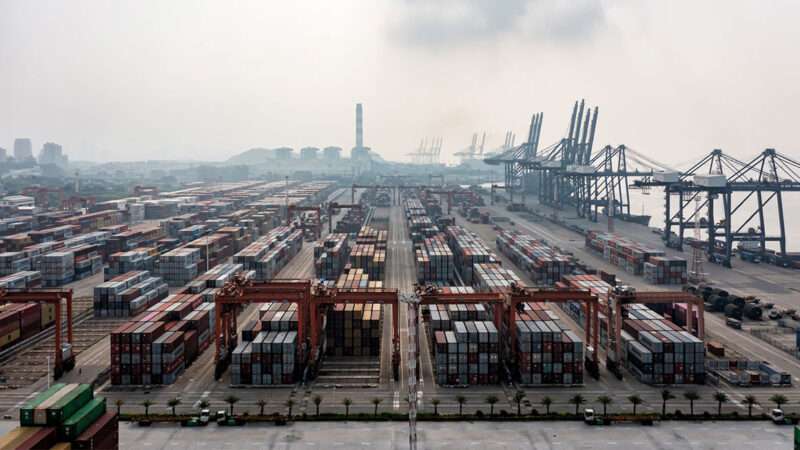
A distressing amount of deliberate amnesia swirls around American trade policy these days—affecting not only the two men cynically pandering to voters in the presidential race, but also the experts who really ought to know better.
"I think that link, in terms of tariffs to prices, has been largely debunked," U.S. Trade Representative Katherine Tai told reporters during a mid-May press conference at the White House.
Tai later walked back those remarks, but they were telling nonetheless. Of course that link hasn't been debunked! The U.S. International Trade Commission concluded in a report released just last year that U.S. consumers and businesses "bore nearly the full cost" of the various tariffs imposed by former President Donald Trump. Numerous other studies published in recent years have come to the same conclusion: Tariffs are taxes on Americans, and they artificially raise prices.
Indeed, if tariffs didn't raise prices, they would be utterly ineffective. The entire purpose of a tariff is to shift consumer behavior away from politically disfavored goods—such as imports from China—toward domestic-made items that would otherwise lose out in a free market of price competition.
That's a fact President Joe Biden used to know but has now conveniently forgotten. "Trump doesn't get the basics. He thinks his tariffs are being paid by China," Biden argued in June 2019. "Any freshman econ student could tell you that the American people are paying his tariffs."
Perhaps Biden needs to retake Econ 101, too. In May, the White House announced new tariffs on electric vehicles (E.V.s), advanced batteries, heavy machinery used at ports, and basic medical equipment such as syringes and rubber gloves.
The tariffs targeting E.V.s are particularly confusing for the Biden administration, which has invested a lot of political capital (and tax dollars) in getting Americans to ditch internal combustion–based transportation. If you want widespread adoption of new technology, artificially hiking the prices of E.V.s is a strange way to do it. It appears that protectionism for American automakers is ultimately more important to the president than reducing emissions.
Trump, meanwhile, is promising even more tariffs if voters return him to the White House. In various interviews this year, Trump has promised to impose a 10 percent tariff on all imports to the U.S. and a 60 percent tariff on goods from China.
When he cranked up tariffs in 2018, Trump at least tried to claim there was some national security basis for doing so. Now he's effectively admitting it's naked protectionism, repeatedly calling the idea "a ring around the county" that would keep out foreign competition.
Regardless of the rationale, it will be American consumers and businesses bearing the cost. An analysis by the Tax Foundation found that Trump's proposed 10 percent tariff would be equivalent to a $300 billion tax increase. As with any tax increase, the tariff would sap economic growth and reduce employment—because you can't make as much stuff when everything is more expensive. Assuming other countries would also raise trade barriers in retaliation, the final toll would be more than 825,000 jobs lost, according to Tax Foundation Senior Economist Erica York.
Causing the prices of all imported goods to increase is a bad idea at any time, but a particularly bizarre one when polls show inflation is the top economic concern for many Americans. Various estimates suggest Trump's proposed new tariffs would cost the average American family more than $1,500 annually. Expect some of those higher costs to hit your pantry, because 60 percent of the fresh fruit consumed by Americans is imported, as is 99 percent of all coffee and more than 70 percent of seafood.
Even if tariffs were effective at spurring domestic industries by protecting them from foreign competition—a dubious claim, but one that tariff advocates often make—how is artificially jacking up the price of food that doesn't grow in America going to help anyone?
Six years after Trump started ratcheting tariffs higher, there is scant evidence that higher import taxes on Americans have changed China's behavior on the world stage—which was the original aim. Nevertheless, the two major party presidential candidates are competing to out-tariff one another, preferring political pandering over economic principles and empirical evidence.
The post Both Trump and Biden Are Promising More Tariffs appeared first on Reason.com.







